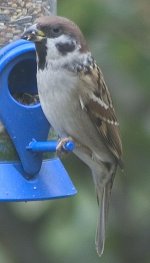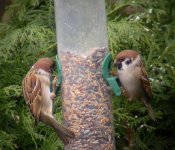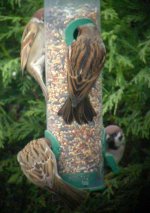Just a quick question. I am still a real novice, and happened to see the Bill Oddie's programme on Beeb 2 this afternoon. He mentioned that tree sparrows are now quite rare, and that the only place that you are guaranteed to see them is the Rutland Water Reserve??? I have 6-10 that visit my garden on a daily basis - should I be doing anything to encourage more? eg. any particular type of seed - provide special nest boxes etc??
Any advice gratefully received.
Thanks
Hello gary
I was fortunate enough to listen to a lecture on Tree Sparrow survival which was given after a 5 year study of the said bird.
The study involved
1- Supplementary feeding
2- Provision of Nesting sites
3- Study of food given to young in the nest.
4- Distance noted for foraging for food and nest sights.
I would say that you are doing good already with the food supplied in copious amounts. The food used in the study was high energy mix, or in the main Sunflower hearts
The nest boxes the study used were put up trees at a regular nest box height but the terrace was not used as with the House Sparrows. Thay used single Tit boxes with 28-32mm hole size which were located loosely in groups.
The main points of interest were the young birds as it seemed the young were not getting to adult stage due to lack of food, namely insects. A good idea to help the young in your garden would be possibly, if funds permit, to supply mealworm at breeding season. Another way would be to plant plants which have a great insect population associated with them. A good interesting route is gardening for wildlife.
The other point noted was that the birds were pretty sedentary and pairs built long lasting, even life pairs.
http://www.rutlandwater.u-net.com/rw/RW_Tresp.htm
Have a look at the info on this site if you have the time quite interesting.
I have to say you are very lucky in having these birds in your garden I think most would be envious. Good luck and hopfully the colony will expand with your help.








